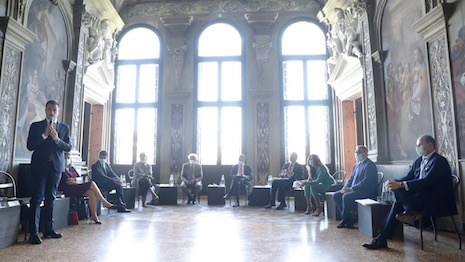 The newly formed Soft Power Club gathers at the Prada Foundation's office in Venice, Italy to host the "Shaping a Sustainable Multilateralism" conference Sept. 1. Photo by Vittorio Zunino Celotto/Getty Images for Fondazione Prada)
The newly formed Soft Power Club gathers at the Prada Foundation's office in Venice, Italy to host the "Shaping a Sustainable Multilateralism" conference Sept. 1. Photo by Vittorio Zunino Celotto/Getty Images for Fondazione Prada) Industry and geopolitical leaders joined forces Sept. 1 at the Prada Foundation’s office in Venice, Italy in a newly created Soft Power Club to debate “Shaping a Sustainable Multilateralism: How the fashion industry can contribute to sustainable development.”
VENICE, Italy – At 10.30 p.m. on Aug. 30 the water in Piazza San Marco in Venice is rising. Tourists frolic in a pond of pastel reflections, smartphones in hand as they record the footage.
Whilst the pictures and face-masked selfies are full of charm, a heavy message is looming: within the fight against a global pandemic, climate change is an inescapable culprit, with sustainable reform the only solution.
The next morning marks the beginning of the first Soft Power Club Conference.
No soft touches
Spearheaded by Francesco Rutelli, a force of cultural leadership as president of ANICA, Italy’s National Association of Film and Audiovisual Industry, and chair of the Center for a Sustainable Future, the club is inspired by Joseph Nye’s theory on how persuasion and intellectual seduction should be used to obtain desired behaviors.
Traditionally, the term has been used in political negotiation and international relations yet with Mr. Rutelli’s Soft Power Club, the tactic is applied to the pressing crisis of climate erosion by connecting cultural leaders with policy makers, diplomats and economists.
The setting of Venice, a home for cultural multilateralism since the 1400s is relevant and bittersweet as this center of history is faced with daily reminders that the sustainable reform is an urgency, not an option.
“Fashion is a soft power,” said Venice’s deputy mayor, Simone Venturini, just like film and the arts, so it made perfect sense for the club to commence its second day of discussions at the Prada Foundation with an introduction from Prada’s own chairman, Carlo Mazzi.
While brands such as Prada can be very proud of their sustainable reforms, Yann Wehrling, French Ambassador in change of the Environment, Ministry of Europe and Foreign Affairs, reminds the room that the industry is still responsible for 1.7 billion tons of carbon dioxide emissions per year.
The road ahead is long: abundance and speed can be blamed for environmental decay, but also thanked for economic prosperity, presenting a conundrum in a year of economic contraction.
Over the past eight months, luxury and fashion have been thrown into unprecedented crisis because of the pandemic’s ability to make consumers suddenly stop buying non-essentials.
“COVID-19 has been our reality check,” said Professor Marzio Galeotti, “and responding or adapting too late will be a brand’s biggest downfall … [plus] all future investment firms will only seek sustainable positionings.”
Slow fashion movement?
This year’s unexpected slamming of the brake has brought to light the need to change operational models completely, making more of less and finding profitability in a slower process.
“The virus has taught us to slow down,” said Matteo Lunelli, president of the Altagamma Foundation.
So, brands will need to grasp the new codes, whilst reckoning with internal production reforms, he said.
Yet, as Clara Tosi Pamphili, the sessions moderator and vice president of Palaexpo, declared, “Fashion is the home of creative experimentation and dreams ... in the pursuit of gaining time and speed, the industry lost the slower artisanal touch. Embracing sustainability means returning to a slower consciousness.”
Therefore, for individual brands, the job at hand is two-fold: operationally to redesign the internal process leading to a responsible journey and output, then externally to dictate a new narrative where slower is deemed better and responsibility is not a compromise, but an ultimate desire.
FOR A CONSUMER who is accustomed to speed, this evolution will require all the tools of soft power: persuasion, education, cajoling and seduction – no small feat, but a task that will require collaboration, storytelling and cross-sector expertise. This is agenda for Mr. Rutelli’s club moving forward.
Livia Stefanini is a brand strategy specializing in the luxury and premium lifestyle segments and was previously head of Havas Group's LuxHub U.K. Reach her at liviastefanini@gmail.com.